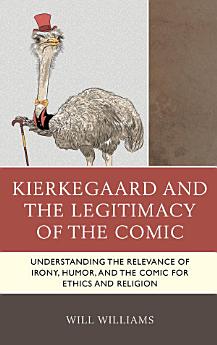Kierkegaard and the Legitimacy of the Comic: Understanding the Relevance of Irony, Humor, and the Comic for Ethics and Religion
Will Williams
Sep 2018 · Bloomsbury Publishing PLC
Ebook
226
Pages
reportRatings and reviews aren’t verified Learn More
About this ebook
While some see the comic as trivial, fit mainly for amusement or distraction, Søren Kierkegaard disagrees. This book examines Kierkegaard’s earnest understanding of the nature of the comic and how even the triviality of comic jest is deeply tied to ethics and religion. It rigorously explicates terms such as “irony,” “humor,” “jest,” and “comic” in Kierkegaard, revealing them to be essential to his philosophical and theological program, beyond aesthetic interest alone.
Drawing centrally from Kierkegaard’s most concentrated treatment of these ideas, Concluding Unscientific Postscript (1846), this account argues that he defines the comic as a “contradiction” or misrelation that is essentially (though not absolutely) painless because it provides a “way out.” The comic lies in a contradiction between norms and so springs from one’s viewpoint, whether ethical or religious.
“Irony” and “humor” play essential transitional roles for Kierkegaard’s famous account of the stages of existence because subjective development is closely tied to one’s capacity to perceive the comic, making the comic both diagnostic of and formative for one’s subjective maturity. For Kierkegaard, the Christian is far from humorless, instead having the maximal comic perception because he has the highest possible subjective development.
The book demonstrates that the comic is not the expression of a particular pseudonym or of a single period in Kierkegaard’s thinking but is an abiding and fundamental concept for him. It finds his comic understanding even outside of Postscript, locating it in such differing works as Prefaces (1844), Upbuilding Discourses in Various Spirits (1847), and the Corsair affair (c.1845-1848).
The book also examines the comic in contemporary Kierkegaard scholarship. First, it argues that Deconstructionists, while accurately perceiving the widespread irony in Kierkegaard’s corpus, incorrectly take the irony to imply a lack of earnest interest in philosophy and theology, misunderstanding Kierkegaard on the nature of irony. Second, it considers two theological readings to argue that their positions, while generally preferable to the Deconstructionists’, lack the same attentiveness to the comic’s role in Kierkegaard. Their significant theological arguments would be strengthened by increased appreciation of the legitimate power of the comic for cultivating ethics and religion.
Drawing centrally from Kierkegaard’s most concentrated treatment of these ideas, Concluding Unscientific Postscript (1846), this account argues that he defines the comic as a “contradiction” or misrelation that is essentially (though not absolutely) painless because it provides a “way out.” The comic lies in a contradiction between norms and so springs from one’s viewpoint, whether ethical or religious.
“Irony” and “humor” play essential transitional roles for Kierkegaard’s famous account of the stages of existence because subjective development is closely tied to one’s capacity to perceive the comic, making the comic both diagnostic of and formative for one’s subjective maturity. For Kierkegaard, the Christian is far from humorless, instead having the maximal comic perception because he has the highest possible subjective development.
The book demonstrates that the comic is not the expression of a particular pseudonym or of a single period in Kierkegaard’s thinking but is an abiding and fundamental concept for him. It finds his comic understanding even outside of Postscript, locating it in such differing works as Prefaces (1844), Upbuilding Discourses in Various Spirits (1847), and the Corsair affair (c.1845-1848).
The book also examines the comic in contemporary Kierkegaard scholarship. First, it argues that Deconstructionists, while accurately perceiving the widespread irony in Kierkegaard’s corpus, incorrectly take the irony to imply a lack of earnest interest in philosophy and theology, misunderstanding Kierkegaard on the nature of irony. Second, it considers two theological readings to argue that their positions, while generally preferable to the Deconstructionists’, lack the same attentiveness to the comic’s role in Kierkegaard. Their significant theological arguments would be strengthened by increased appreciation of the legitimate power of the comic for cultivating ethics and religion.
About the author
Will Williams is lecturer at Baylor University
Rate this ebook
Tell us what you think.
Reading information
Smartphones and tablets
Install the Google Play Books app for Android and iPad/iPhone. It syncs automatically with your account and allows you to read online or offline wherever you are.
Laptops and computers
You can listen to audiobooks purchased on Google Play using your computer's web browser.
eReaders and other devices
To read on e-ink devices like Kobo eReaders, you'll need to download a file and transfer it to your device. Follow the detailed Help Center instructions to transfer the files to supported eReaders.








